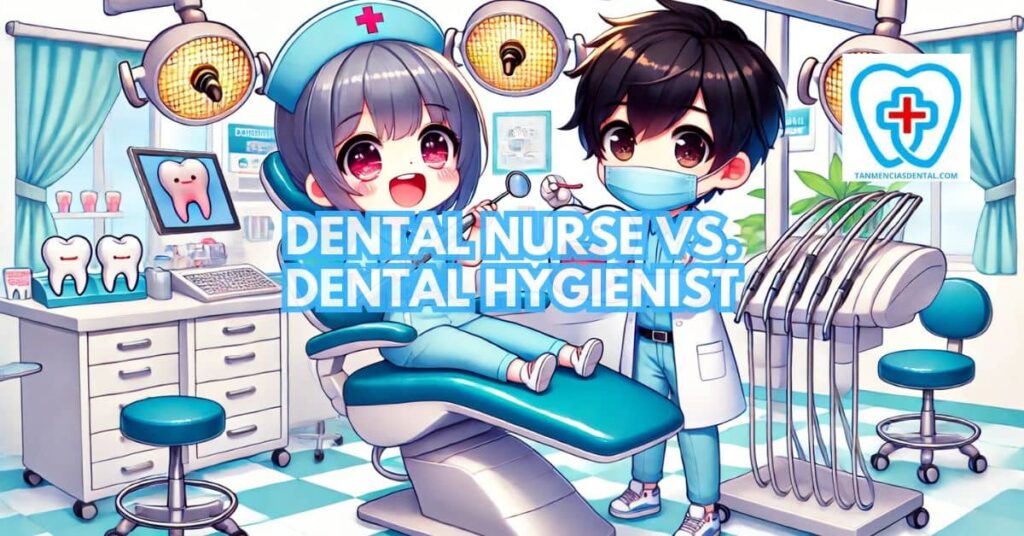If you are considering a career in dentistry, you may wonder about the dental nurse vs. dental hygienist roles.
Both jobs are important in a dental practice and help make patient care work smoothly.
Dental nurses handle tasks like preparing tools and managing clinic records, while dental hygienists focus on cleaning teeth and teaching good oral habits.
We’ll explain their daily tasks, training paths, and future job prospects.
By understanding these differences and similarities, you can choose the career that best matches your interests and skills.
1. The Dental Powerhouse: Dental Nurses and Hygienists Working Together
Dental nurses and hygienists form a vital team in any dental practice, working closely to support both patients and dentists.
Their collaboration ensures that patients receive comprehensive care, from routine cleanings to complex procedures, while also promoting long-term oral health.
Dental nurses assist with tasks such as sterilizing instruments, preparing treatment rooms, and ensuring patients feel comfortable before and during procedures.
Meanwhile, dental hygienists focus on preventive care by performing professional cleanings, taking X-rays, and educating patients about proper oral care habits.
Both professionals play an essential role in helping individuals maintain good oral health by providing guidance on brushing, flossing, and dietary choices that affect teeth and gums.
In some cases, a registered nurse may also be involved in dental settings, assisting with patient monitoring and managing medical emergencies.
By working together, dental nurses, hygienists, and other healthcare professionals contribute to a smooth and effective dental care environment that prioritizes patient well-being.
🦷 How Teeth Whitening Foam Can Quickly Brighten Your Smile
2. Unpacking the Toolbox: Core Responsibilities of Dental Nurses vs. Dental Hygienists
Dental nurses handle a variety of tasks, including preparing treatment rooms, sterilizing instruments, and assisting during dental procedures.
They also manage patient records and ensure the clinic runs smoothly.
On the other hand, dental hygienists focus on preventive care, such as performing dental cleanings, applying sealants, and conducting oral health assessments.
They also play a key role in patient education, teaching proper brushing and flossing techniques.
Understanding these responsibilities highlights the unique contributions of each role.
🦷 Boost Your Confidence with Prosthodontic Treatments in Marikina
3. Charting Your Course: Educational Paths for Dental Nurses and Hygienists
The educational paths for dental nurses and hygienists differ significantly based on training requirements and job responsibilities.
Dental nurses typically complete a diploma or certificate program, which can take about one to two years and includes courses on infection control, dental procedures, and patient care.
These programs prepare them to assist dentists under supervision by setting up treatment areas, sterilizing instruments, and supporting patients during procedures.
In contrast, dental hygienists need an associate degree in dental hygiene, which takes about two to three years and includes both classroom instruction and hands-on clinical training.
Because their role involves performing cleanings, taking X-rays, and educating patients about oral health, hygienists must also pass licensing exams before they can work independently.
The average salary for dental hygienists is typically higher than that of dental nurses due to the additional education and responsibilities required for the job.
Regardless of their role, both types of nurses work in dental offices to provide essential care and ensure that patients receive quality treatment.
🦷 Why Flossing Can Harm Your Gums: Myths You Need to Know
4. A Day in the Dental Chair: Daily Life of a Dental Nurse vs. Hygienist
Dental nurses typically start their day by preparing the treatment rooms and ensuring all instruments are sterilized and ready.
They assist dentists during procedures, use hand instruments, and take notes on patient records.
Throughout the day, they also manage administrative tasks like scheduling appointments and handling patient inquiries.
Dental hygienists, however, spend their days focused on direct patient care.
They perform cleanings, conduct oral health assessments, take X-rays, and provide patients with education on maintaining good oral hygiene.
🦷 Understanding the Difference Between Dentists and Dental Surgeons

5. Examining the Job Market: Demand and Future Growth
The number of jobs for dental nurses and dental hygienists is growing.
Many areas are seeing more dental clinics open as more people need care.
Studies show that dental hygienists often have extra opportunities because of their special skills.
Dental nurses are important for keeping clinics organized and supporting dentists during treatments.
These trends suggest a stable future with more career options in dental care.
🦷 Can Dental Cleaning Hurt Your Teeth? The Truth About Risks and Benefits
6. Salary Showdown: Comparing Earnings Potential for Dental Nurses and Hygienists
Salaries for dental nurses and hygienists vary widely based on factors such as location, experience, and education level.
Generally, dental hygienists earn higher salaries due to their specialized skills and extensive education.
Dental nurses have a more modest earning potential, which reflects their role’s supportive nature.
On average, dental hygienists can expect to earn significantly more per year compared to dental nurses.
Understanding these differences in potential earnings can be a crucial factor in choosing a career path.
🦷 Are Electric Toothbrushes Safe? What You Should Understand
7. Climbing the Ladder: Career Advancement Opportunities in Dental Nursing and Hygiene
Career advancement opportunities are available for both dental nurses and hygienists, though they differ in nature.
Dental nurses can advance to senior or specialized roles, such as a lead dental nurse or an orthodontic assistant.
Further education and certification can open up these opportunities.
Dental hygienists have opportunities for further specialization in areas like periodontics or pediatric dentistry and can also pursue roles in education or research.
Both career paths offer growth, but the specific routes and opportunities can vary greatly.
🦷 How Whitening Powder Can Help Brighten Your Smile Gradually
8. The Right Fit: Essential Skills and Traits for Dental Nurses and Hygienists
Choosing the right career involves assessing your skills and traits to see which role fits best.
Dental nurses need to be highly organized, detail-oriented, and capable of working well under pressure.
They must also have good interpersonal skills to interact with patients and the dental team.
Dental hygienists need excellent communication skills to educate patients effectively, as well as precision and a meticulous approach to perform cleanings and other tasks accurately.
Understanding these essential skills can help you determine which career aligns with your strengths and interests.
🦷 Can Dentists Remove Tonsil Stones? Here’s What You Need to Know
9. Finding Your Perfect Smile: Choosing Between a Dental Nurse or Hygienist Career
Deciding between a career as a dental nurse or hygienist depends on your interests, skills, and career goals.
If you enjoy supporting a team and handling a variety of tasks, a dental nursing career might be the right fit.
On the other hand, if you are passionate about direct patient care and preventive oral health, becoming a dental hygienist could be more fulfilling.
Consider the type of work environment you prefer and the level of patient interaction you desire.
Reflecting on these aspects can help you find the career path that best matches your aspirations.
🦷 Can You Eat After Using Whitening Strips? The Important Dos and Don’ts
10. Licensed to Care: Certification and Registration Requirements
Both dental nurses and hygienists must meet specific certification and registration requirements to practice.
Dental nurses often need to complete an accredited training program and pass relevant exams to become certified.
Dental hygienists, however, must obtain an associate degree in dental hygiene, followed by passing national and state licensing exams.
These requirements ensure that both dental nurses and hygienists are well-prepared and qualified to provide high-quality care.
Understanding these certification processes is crucial for entering and advancing in these professions.
🦷 Are Electric Toothbrushes Really Bad? The Truth About Brushing
11. Work-Life Harmony: Balancing Your Career with Personal Life as a Dental Nurse or Hygienist
Achieving a balance between career and personal life is important for both dental nurses and hygienists.
Dental nurses often have more predictable schedules, typically working standard office hours.
This can make it easier to plan and maintain a stable work-life balance.
Dental hygienists may have more flexible schedules, with opportunities to work part-time or adjust their hours.
Evaluating these factors can help you choose a career that supports your personal and professional well-being.
🦷 Tan-Mencias Smile Care Clinic
👨⚕️ Conclusion
Choosing between a career as a dental nurse or a dental hygienist involves careful consideration of various factors.
Assess your interests, skills, and long-term goals to determine which path aligns best with your aspirations.
Both roles offer rewarding opportunities in the dental field, each with its own unique set of responsibilities and benefits.
By understanding the differences and similarities between these careers, you can make an informed decision that leads to a fulfilling and successful career in dental care.
😊 Self-Promotion
Visit Tan-Mencias Dental Clinic in Parang, Marikina City, for top-notch dental care delivered with a smile!
Our friendly team is here to ensure your dental experience is comfortable and stress-free.
Have questions or need to book an appointment?
Give us a call at 9171451074, send us a message through our Facebook page, or use the contact form on our website.
We look forward to helping you achieve a healthy, beautiful smile!

